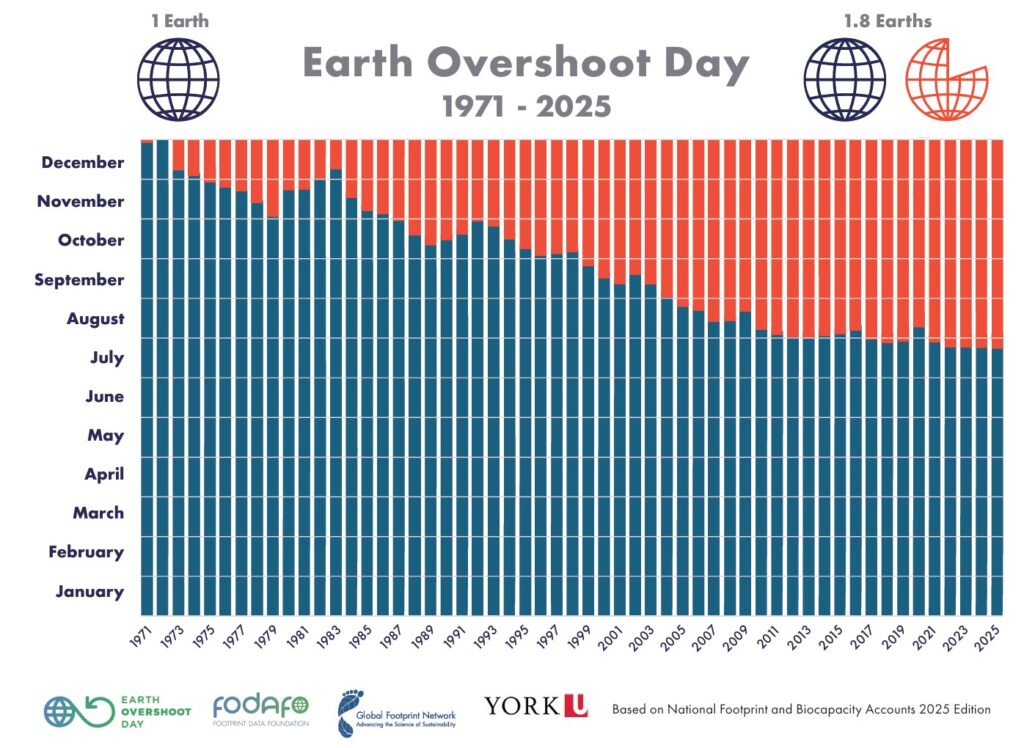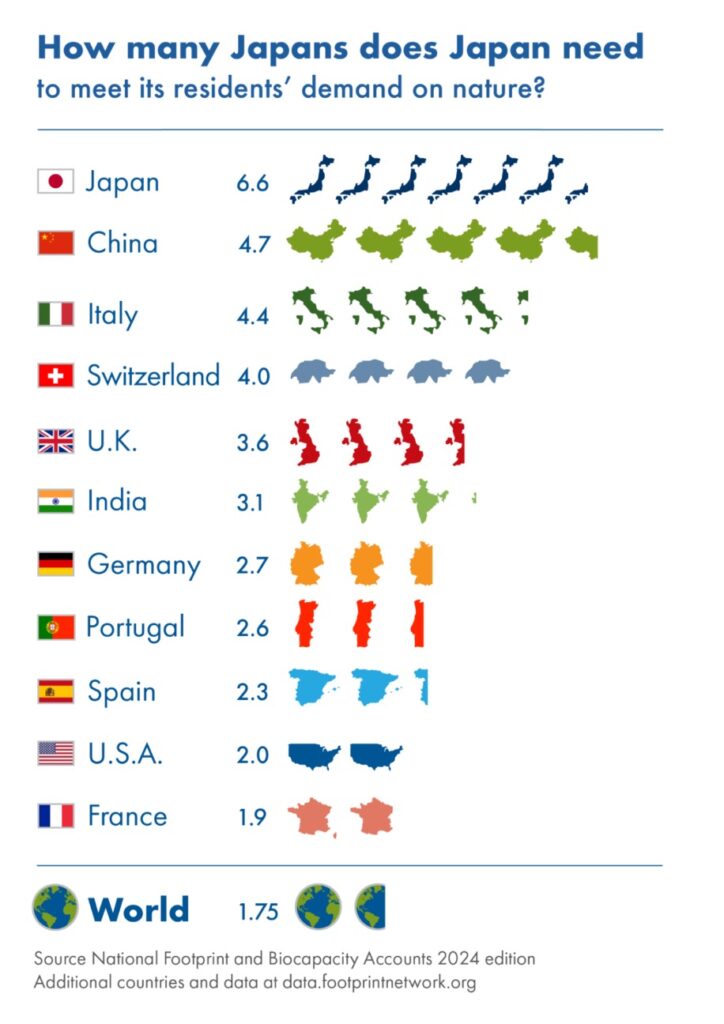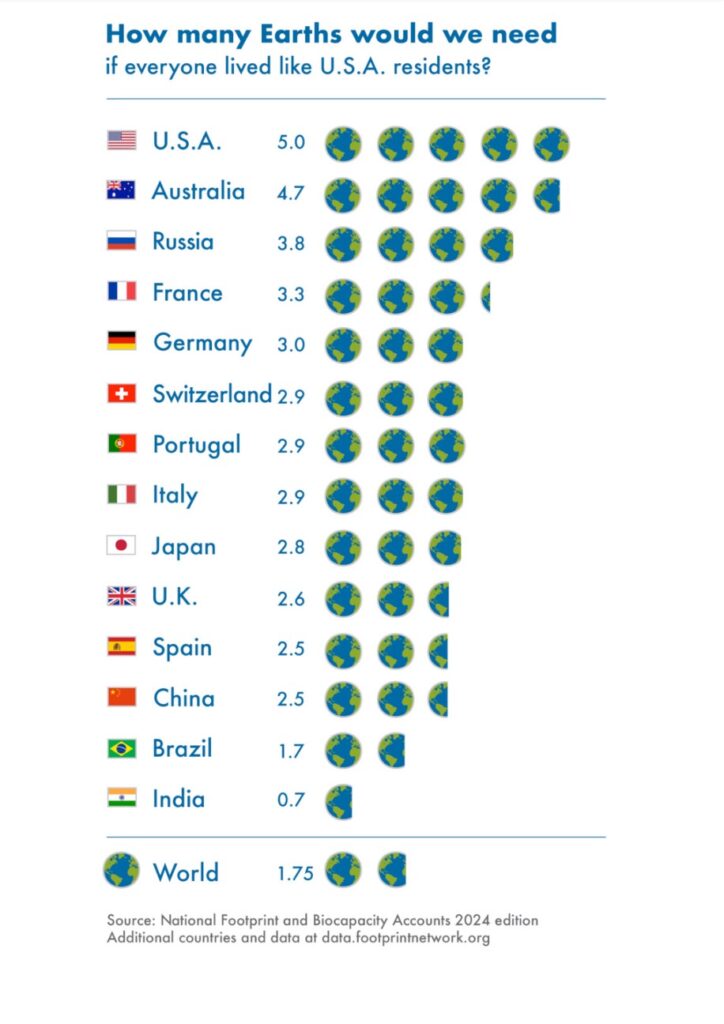

Earth Overshoot Day 2025 falls on July 24th
Correcting Humanity’s Largest Market Failure
GENEVA, SWITZERLAND — July 24th marks this year’s Earth Overshoot Day, the date when humanity’s demand on nature surpasses Earth’s capacity to replenish nature during the entire year. Calculated by Global Footprint Network, the international sustainability organization that pioneered the Ecological Footprint, this date is based on the National Footprint and Biocapacity Accounts maintained by York University. Why it is earlier than last year is explained here.
Earth Overshoot Day falling on July 24th means that humanity is currently using nature 1.8 times faster than Earths ecosystems can regenerate. This overshoot occurs because people emit more CO₂ than the biosphere can absorb, use more freshwater than is replenished, harvest more trees than can regrow, fish quicker than stocks replenish, etc. This overuse beyond what nature can renew inevitably depletes Earth’s natural capital. It compromises long-term resource security, especially for those who already struggle to access the resources needed to operate.
The impact of overshoot
Overshoot isn’t just the driver behind biodiversity loss, resource depletion, deforestation, and the buildup of greenhouse gases in the atmosphere, which intensifies extreme weather events. It also fuels stagflation, food and energy insecurity, health crises, and conflict. Regions, cities, companies, and countries that have not prepared for this predictable reality face significantly higher risks.

Choose file size to view/download:
English: small (0.4 MB png) | small (0.3 MB jpg) | PDF (1 MB)
Although this year’s Earth Overshoot Day is the earliest ever, it has remained within a narrow window for over 15 years, consistently occurring just after 7 months of the year have passed. The remainder of the year humanity lives by depleting the planet further. Therefore, even as the date holds steady, the pressure on the planet intensifies because the damage from overshoot is cumulative. Every year’s deficit spending adds to the already existing ecological debt.
Overshoot as a market failure
From an economic perspective, overshoot is a clear example of a market failure. Such failures hurt everyone. It poses a direct threat to overusers, who depend on large volumes of underpriced resource inputs that become increasingly scarce as the market failure persists. If uncorrected, such market failures stimulate overuse which then leads to disruptions or economic shocks. The market failure also represents an economic loss for biocapacity providers, who are not adequately compensated.
For overshoot to end by design, rather than by disaster, this market failure must be corrected.
Solutions that #MoveTheDate are available and financially advantageous. Opportunities exist in five key areas: Cities, Energy, Food, Population, and Planet. The Power of Possibility highlights 100+ options that move Earth Overshoot Day. For example, cutting CO2 emissions from fossil fuels by 50% would #MoveTheDate by three months. There are also businesses that #MoveTheDate as they expand. Such businesses may be the ones best positioned to gain value in a future of climate change and resource constraints.
“We are stretching the limits of how much ecological damage we can get away with. It is now a quarter into the 21st century and we owe the planet at least 22 years of ecological regeneration, even if we stop any further damage now. If we still want to call this planet home, this level of overshoot calls for a scale of ambition in adaptation and mitigation that should dwarf any previous historical investments we have made, for the sake of our common future,” comments Dr. Lewis Akenji, board member of Global Footprint Network.
Dr. Paul Shrivastava, Professor at Pennsylvania State University and Co-President of the Club of Rome comments: “Earth Overshoot Day reminds us that humanity is overconsuming by borrowing from the future. Unchecked, this will lead to default as the environment will be too depleted to offer everything people need. Avoiding financial and ecological default depends on our ability and willingness to pay back the debt. The good news is that avoiding ecological default is possible: We have the economic ability. Let’s now develop the political willingness from individual consumer behavior all the way up to governments’ economic strategies.”
Dr. Mathis Wackernagel, Global Footprint Network co-founder and board member, states: “Because of the nature of physics, overshoot cannot last. It will end either by deliberate design or dumped-on disaster. It should not be too hard to choose which one is preferable, particularly in light of so many possible choices.”
Additional resources
- How Earth Overshoot Day 2025 was calculated
- Overshoot is a market failure
- How to compare the date of Earth Overshoot Day to previous years
- Ecological Footprint data for more than 200 countries and regions
- Infographics and videos available for social media and traditional media
- Introduction to the implications of overshoot
- What overshoot means for businesses
- Solutions to reverse ecological overshoot and bolster biological regeneration
- Ecological Footprint: Managing our Biocapacity Budget (book)
- Personal Footprint Calculator www.footprintcalculator.org
About the Ecological Footprint
The Ecological Footprint is the most comprehensive biological resource accounting metric available. Based on 15,000 data points per country per year, it adds up all of people’s competing demands for biologically productive areas – food, timber, fibers, carbon sequestration, and accommodation of infrastructure. Currently, the carbon footprint, i.e., the carbon emissions from burning fossil fuel, make up 61 percent of humanity’s Ecological Footprint. The National Footprint and Biocapacity Accounts are now produced by York University in Toronto and governed by FoDaFo.
The book “Ecological Footprint: Managing Our Biocapacity Budget” provides an in-depth introduction, drawing on the Footprint’s 30-year experience fighting ecological bankruptcy with robust resource accounting. Excerpts available for publication.
About Global Footprint Network
Global Footprint Network is an international sustainability organization that is helping the world live within the Earth’s means and respond to climate change. Since 2003 we’ve engaged with more than 50 countries, 30 cities, and 70 global partners to deliver scientific insights that have driven high-impact policy and investment decisions. Together, we’re creating a future where all of us can thrive within the limits of our one planet. www.footprintnetwork.org


